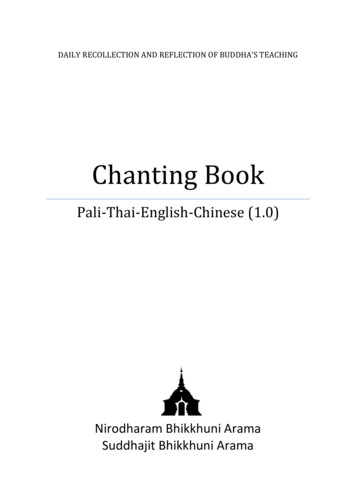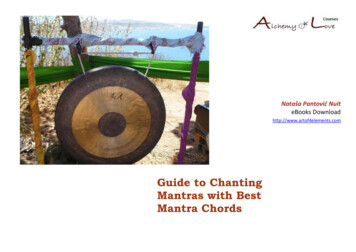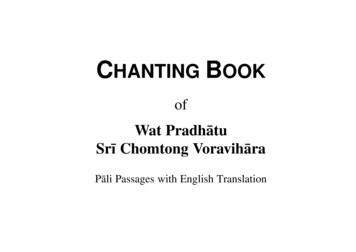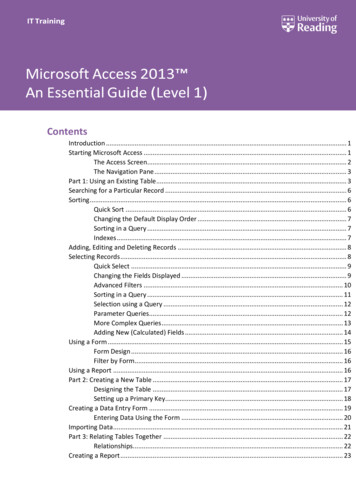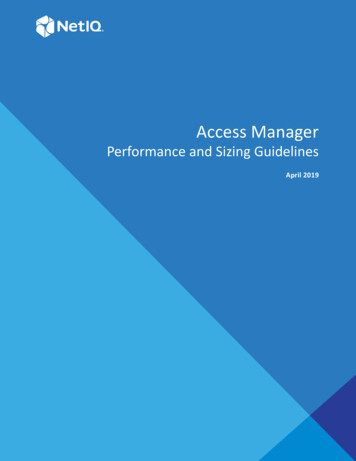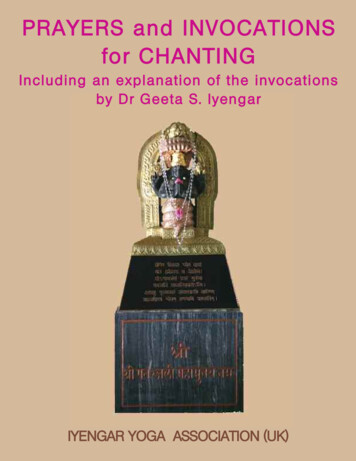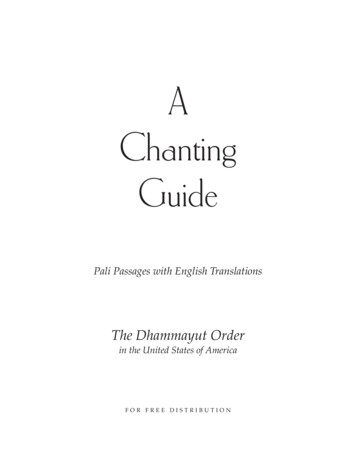
Transcription
AChantingGuidePali Passages with English TranslationsThe Dhammayut Orderin the United States of AmericaFOR FREE DISTRIBUTION
Inquiries concerning this book may be addressed to:Metta Forest MonasteryPO Box 1409Valley Center, CA 92082Copyright The Dhammayut Order in the United States of America 1994Third edition, revised: 2013This book may be copied or reprinted for free distributionwithout permission from the copyright holder.Otherwise all rights reserved.P R I N T E D I N T H E U N I T E D S TAT E S O F A M E R I C A
ContentsPronunciation — iiiMORNING CHANTING – 1E V E N I N G C H A N T I N G – 12REFLECTIONSContemplation of the Body – 23Five Subjects for Frequent Recollection – 25The Verses on Friends – 26The Verses on Respect – 27The Verses on the Noble Truths – 27The Guardian Meditations – 29Ten Reflections – 30The Four Dhamma Summaries – 32Ov›da-p› imokkha G›th› – 33The Sublime Attitudes – 34Dedication of Merit – 37Devat›dipattid›na G›th› – 38REFUGEBuddhaª sara aª gacch›mi – 39N’atthi me sara aª aññaª Mah›-k›ru iko n›tho – 40Bahuª ve sara aª yanti – 42DISCOURSESDhamma-cakkappavattana Sutta(Setting the Wheel of Dhamma in Motion) – 43Anatta-lakkha a Sutta (The Not-self Characteristic) – 52fiditta-pariy›ya Sutta (The Fire Discourse) – 61Mah›-samaya Sutta (The Great Meeting) – 69Dhamma-niy›ma Sutta (The Orderliness of the Dhamma) – 85Magga-vibhaºga Sutta (An Analysis of the Path) – 87S›r› ıya-dhamma Sutta (Conditions for Amiability) – 92Gotamı Sutta (The Discourse to Gotamı) – 95Paticca Samupp›da (Dependent Origination) – 97Heedfulness (Appam›do amataª padaª ) – 99MERIT FOR THE DECEASEDThe Three Inspired Verses (Yad› have ) – 100The Housebuilder (Aneka-j›ti-saºs›raª ) – 101
iiCONTENTSThe Mountain (Yath›pi sel› vipul› ) – 101Noble Wealth (Yassa saddh› tath›gate ) – 102An Auspicious Day (Atıtaª n›nv›gameyya ) – 103The Three Characteristics (Sabbe saºkh›r› anicc›’ti ) – 104Compounded Things (Anicc› vata saºkh›r› ) – 105Dhammasaºga ı M›tik› P›tha(The List from the Dhamma Groupings) – 106BLESSINGSInvitation to the Devas – 110Namak›ra-siddhi G›th›(The Verses on Success through Homage) – 111Sambuddhe(The Buddhas) – 112Namo-k›ra-a hakaª(The Homage Octet) – 114Maºgala Sutta(The Discourse on Blessings) – 115Cha Ratana Paritta G›th›(The Six Protective Verses from the Discourse on Treasures) – 117Kara ıya Metta Sutta(The Discourse on Goodwill) – 120Khandha Paritta(The Group Protection) – 122Mora Paritta(The Peacock’s Protection) – 123Va aka Paritta(The Baby Quail’s Protection) – 125Dhajagga Paritta(The Top-of-the-Banner-Staff Protection) – 126fi ›n› iya Paritta(Homage to the Seven Past Buddhas) – 127Aºgulim›la Paritta(Ven. Angulimala’s Protection) – 128Bojjhaºga Paritta(The Factor-of Awakening Protection) – 128Buddha-jaya-maºgala G›th›(The Verses of the Buddha’s Victory Blessings) – 130Jaya Paritta(The Victory Protection) – 132
CONTENTSAbhaya Paritta(The Danger-free Protection) – 134Sakkatv› buddha-ratanaª (Having revered the jewel of the Buddha ) – 134Dukkhappatt› (Who have fallen into suffering ) – 135Bhavatu sabba-maºgalaª (May there be every blessing ) – 136FORMAL REQUESTSTaking the Five Precepts – 137Taking the Eight Precepts – 140Ordination for an Eight-Precept Nun – 143Requesting a Discourse – 147Requesting Blessings – 147Requesting Forgiveness – 148FORMAL OFFERINGSFood – 150General Items (after noon) – 151“Forest Cloth” – 151Declaration to the Bhikkhu Saºgha – 152Ka hina Cloth – 153Lodgings – 153Rains Bathing Cloth – 154HOMAGEVis›kha PÒj› – 155fisa ha PÒj› – 159M›gha PÒj› – 162Veneration – 165Homage to the Buddha’s Footprints – 166The Buddha’s Last Words – 167AFTER THE Pfi IMOKKHASıluddesa-p› ha (The Virtue Summary) – 168T›yana-g›th› (The Verse to T›yana) – 169A N U M O D A N fi – 170Mah›-maºgala-cakkav› a (The Great Universe of Blessings) – 180M E D I TAT I O NBreath Meditation: Seven Steps – 182iii
ivPronunciationP›li is the original language of the Theravadin Buddhist scriptures, the closest wehave to the dialect spoken by the Buddha himself. It has no written script of itsown, so every country that has adopted Theravada Buddhism has used its ownscript to transcribe it. In Thailand this has meant that P›li has picked up some ofthe tones of the Thai language, as each consonant & consonant cluster in the Thaialphabet has a built-in tone—high, medium, low, rising, or falling. This accounts forthe characteristic melody of Thai P›li chanting.VowelsP›li has two sorts of vowels: long—›, e, ı, o, Ò, & ay; and short—a, i, & u. Unlike longand short vowels in English, however, the length here refers to the actual amountof time used to pronounce the vowel, and not to its quality. Thus › & a are bothpronounced like the a in father, simply that the sound › is held for approximatelytwice as long as the sound a. The same principle holds for ı & i, and for Ò & u. Thus,when chanting P›li, the vowels are pronounced as follows:a as in fathere as in theyi as in machineo as in gou as in glueay as in Aye!ConsonantsConsonants are generally pronounced as they are in English, with a few unexpected twists:c as in ancientk unaspirated, as in skinkh as in backhandª & º as ngñ as in cañonp unaspirated, as in spotph as in upholsteryt unaspirated, as in stopth as in Thomasv as wCertain two-lettered notations—bh, dh, h, gh, jh—denote an aspirated sound,somewhat in the throat, that we do not have in English and that the Thais do nothave in their language, either. The Thai solution to this problem is to pronounce bhas a throaty ph, dh as a throaty th, and gh as a throaty kh.P›li also contains retroflex consonants, indicated with a dot under the letter: , h, , , , h. These have no English equivalent. They are sounded by curling thetip of the tongue back against the palate, producing a distinct nasal tone.
PRONUNCIATIONvScanningThe meters of P›li poetry consists of various patterns of full-length syllablesalternating with half-length syllables.Full-length syllables:contain a long vowel (›, e, ı, o, Ò, ay); orend with ª; orend with a consonant followed by a syllable beginning with a consonant(e.g., Bud-dho, Dham-mo, Saº-gho).(In this last case, the consonant clusters mentioned above—bh, dh, h, gh,jh, kh, ph, th, h—count as single consonants, while other combinationscontaining h—such as h & mh—count as double.)Half-length syllables end in a short vowel.Thus, a typical line of verse would scan as follows:Van - d› - ma - haª ta - ma - ra - aª si - ra - s› ji - nen - daª111/211/2 1/2 1/211/2 1/2 1 1/211In this book, wherever possible, many of the long compound words have beenbroken down with hyphens into their component words to make them easier toread and—for anyone studying P›li—to understand. This creates only one problemin scanning: When the hyphen is preceded by a consonant (usually m or d) andfollowed by a vowel, the consonant forms a syllable together with the vowel following the hyphen and not with the vowel preceding it. Thus, for instance,dhammam-etaª would scan as dham-ma-me-taª.; and tam-ara aª as ta-ma-ra- aª.If all these rules seem daunting, the best course is simply to listen carefully tothe group and to chant along, following as closely as possible their tempo, rhythm,and pitch. All voices, ideally, should blend together as one.
Additional information on Buddhistteachings can be found rdings of some of the chants in this bookcan be found at:www.dhammatalks.org
1Morning ChantingArahaª samm›-sambuddho bhagav›.The Blessed One is Worthy & Rightly Self-awakened.Buddhaª bhagavantaª abhiv›demi.I bow down before the Awakened, Blessed One.(BOW DOWN)Sv›kkh›to bhagavat› dhammo.The Dhamma is well-expounded by the Blessed One.Dhammaª namass›mi.I pay homage to the Dhamma.(BOW DOWN)Supa ipanno bhagavato s›vaka-saºgho.The Saºgha of the Blessed One’s disciples has practiced well.Saºghaª nam›mi.I pay respect to the Saºgha.(BOW DOWN)D ED I CAT I ON (by l e a der )Yam-amha kho mayaª bhagavantaª sara aª gat›,We have gone for refuge to the Blessed One,(uddissa pabbajit›,) yo no bhagav› satth›(have gone forth on account of) the Blessed One who is our Teacheryassa ca mayaª bhagavato dhammaª rocema.and in whose Dhamma we delight.Imehi sakk›rehi taª bhagavantaª sasaddhammaªsas›vaka-saºghaª abhipÒjay›ma.With these offerings we worship most highly that Blessed One together withthe True Dhamma & the Saºgha of his disciples.
2MORNING CHANTINGHanda mayaª buddhassa bhagavato pubba-bh›ganamak›raª karomase:Now let us chant the preliminary passage in homage to the Awakened One,the Blessed One:(ALL)[Namo tassa] bhagavato arahatosamm›-sambuddhassa. ( T H R E E T I M E S )Homage to the Blessed One, the Worthy One,the Rightly Self-awakened One.Praise for the Buddha(LEAD ER)Handa mayaª buddh›bhithutiª karomase:Now let us give high praise to the Awakened One:(ALL) [Yo so tath›gato] arahaª samm›-sambuddho,He who has attained the Truth, the Worthy One, Rightly Self-awakened,Vijj›-cara a-sampanno sugato lokavidÒ,consummate in knowledge & conduct, one who has gone the good way,knower of the cosmos,Anuttaro purisa-damma-s›rathi satth› devamanuss›naª buddho bhagav›;unexcelled trainer of those who can be tamed, teacher of human & divinebeings; awakened; blessed;Yo imaª lokaª sadevakaª sam›rakaªsabrahmakaª,Sassama a-br›hma iª pajaª sadeva-manussaªsayaª abhiññ› sacchikatv› pavedesi.who made known—having realized it through direct knowledge—this worldwith its devas, m›ras, & brahm›s, its generations with their contemplatives& br›hmans, their rulers & common people;
MORNING CHANTINGYo dhammaª desesi ›di-kaly› aª majjhekaly› aª pariyos›na-kaly› aª;who explained the Dhamma fine in the beginning, fine in the middle,fine in the end;S›tthaª sabyañjanaª kevala-paripu aªparisuddhaª brahma-cariyaª pak›sesi:who expounded the holy life both in its particulars & in its essence, entirelycomplete, surpassingly pure:Tam-ahaª bhagavantaª abhipÒjay›mi,Tam-ahaª bhagavantaª siras› nam›mi.I worship most highly that Blessed One,to that Blessed One I bow my head down.(BOW DOWN)Praise for the Dhamma(LEAD ER)Handa mayaª dhamm›bhithutiª karomase:Now let us give high praise to the Dhamma:(ALL) [Yo so sv›kkh›to] bhagavat›The Dhamma well-expounded by the Blessed One,dhammo,Sandi hiko ak›liko ehipassiko,to be seen here & now, timeless, inviting all to come & see,Opanayiko paccattaª veditabbo viññÒhi:pertinent, to be seen by the observant for themselves:Tam-ahaª dhammaª abhipÒjay›mi,Tam-ahaª dhammaª siras› nam›mi.I worship most highly that Dhamma,to that Dhamma I bow my head down.(BOW DOWN)3
4MORNING CHANTINGPraise for the Saºgha(LEAD ER) Handa mayaª saºgh›bhithutiªNow let us give high praise to the Saºgha:karomase:(ALL) [Yo so supa ipanno] bhagavato s›vaka-saºgho,The Saºgha of the Blessed One’s disciples who have practiced well,Uju-pa ipanno bhagavato s›vaka-saºgho,the Saºgha of the Blessed One’s disciples who have practicedstraightforwardly,Ñ›ya-pa ipanno bhagavato s›vaka-saºgho,the Saºgha of the Blessed One’s disciples who have practiced methodically,S›mıci-pa ipanno bhagavato s›vaka-saºgho,the Saºgha of the Blessed One’s disciples who have practiced masterfully,Yadidaª catt›ri purisa-yug›ni a ha purisa-puggal›:i.e., the four pairs—the eight types—of noble ones:Esa bhagavato s›vaka-saºgho—That is the Saºgha of the Blessed One’s disciples—fihuneyyo p›huneyyo dakkhi eyyo añjali-kara ıyo,worthy of gifts, worthy of hospitality, worthy of offerings, worthy of respect,Anuttaraª puññakkhettaª lokassa:the incomparable field of merit for the world:Tam-ahaª saºghaª abhipÒjay›mi,Tam-ahaª saºghaª siras› nam›mi.I worship most highly that Saºgha,to that Saºgha I bow my head down.(BOW DOWN)
MORNING CHANTINGSalutation to the Triple Gem&The Topics for Chastened Dispassion(LEAD ER)Handa mayaª ratanattayappa ›ma-g›th›yo cevasaªvega-vatthu-paridıpaka-p› hañ-ca bha ›mase:Now let us recite the stanzas in salutation to the Triple Gem together withthe passage on the topics inspiring a sense of chastened dispassion:(ALL)[Buddho susuddho] karu ›-maha avo,Yoccanta-suddhabbara-ñ› a-locano,Lokassa p›pÒpakilesa-gh›tako:Vand›mi buddhaª aham-›darena taª.The Buddha, well-purified, with ocean-like compassion,possessed of the eye of knowledge completely purified,destroyer of the evils & corruptions of the world:I revere that Buddha with devotion.Dhammo padıpo viya tassa satthuno,Yo magga-p›k›mata-bhedabhinnako,Lokuttaro yo ca tad-attha-dıpano:Vand›mi dhammaª aham-›darena taª.The Teacher’s Dhamma, like a lamp,divided into Path, Fruition, & the Deathless,both transcendent (itself) & showing the way to that goal:I revere that Dhamma with devotion.Saºgho sukhett›bhyatikhetta-saññito,Yo di ha-santo sugat›nubodhako,Lolappahıno ariyo sumedhaso:Vand›mi saºghaª aham-›darena taª.5
6MORNING CHANTINGThe Saºgha, called a field better than the best,who have seen peace, awakening after the one gone the good way,who have abandoned heedlessness—the noble ones, the wise:I revere that Saºgha with ttayaª vandayat›bhisaºkhataª,Puññaª may› yaª mama sabbupaddav›,M› hontu ve tassa pabh›va-siddhiy›.By the power of the merit I have madein giving reverence to the Triple Gemworthy of only the highest homage,may all my obstructions cease to be.* * *Idha tath›gato loke uppanno arahaª samm›sambuddho,Here, One attained to the Truth, Worthy & Rightly Self-awakened, hasappeared in the world,Dhammo ca desito niyy›niko upasamikoparinibb›niko sambodhag›mı sugatappavedito.and Dhamma is explained, leading out [of samsara], calming, tendingtoward total Unbinding, going to self-awakening, declared by one who hasgone the good way.Mayan-taª dhammaª sutv› evaª j›n›ma,Having heard the Dhamma, we know this:J›tipi dukkh› jar›pi dukkh› mara ampi dukkhaª,Birth is stressful, aging is stressful, death is �s›pi dukkh›,sorrow, lamentation, pain, distress, & despair are stressful,
MORNING CHANTINGAppiyehi sampayogo dukkho piyehi vippayogodukkho yam-p’icchaª na labhati tampi dukkhaª.association with things disliked is stressful, separation from things liked isstressful, not getting what one wants is stressful.Saºkhittena pañcup›d›nakkhandh› dukkh›,In short, the five clinging-aggregates are andho,the form clinging-aggregate,VedanÒp›d›nakkhandho,the feeling clinging-aggregate,SaññÒp›d›nakkhandho,the perception the fabrication clinging-aggregate,Viññ› Òp›d›nakkhandho.the consciousness clinging-aggregate.Yesaª pariññ›ya,Dharam›no so bhagav›,Evaª bahulaª s›vake vineti,So that they might fully understand this, the Blessed One, while still alive,often instructed his listeners in this way,Evaª bh›g› ca panassa bhagavato s›vakesuanus›sanı,Bahulaª pavattati:many times did he emphasize this part of his admonition:“RÒpaª aniccaª,Vedan› anicc›,“Form is inconstant,Feeling is inconstant,7
8MORNING CHANTINGSaññ› anicc›,Perception is inconstant,Saºkh›r› anicc›,Fabrications are inconstant,Viññ› aª aniccaª,Consciousness is inconstant,RÒpaª anatt›,Form is not-self,Vedan› anatt›,Feeling is not-self,Saññ› anatt›,Perception is not-self,Saºkh›r› anatt›,Fabrications are not-self,Viññ› aª anatt›,Consciousness is not-self,Sabbe saºkh›r› anicc›, All fabrications are inconstant,Sabbe dhamm› anatt›ti.” All phenomena are not-self.”Te (W OMEN: T› ) mayaª,Oti ›mha j›tiy› jar›-mara ena,Sokehi paridevehi dukkhehi domanassehi up›y›sehi,Dukkh’oti › dukkha-paret›,All of us, beset by birth, aging, & death, by sorrows, lamentations, pains,distresses, & despairs, beset by stress, overcome with stress, (consider),“Appeva n›m’imassa kevalassadukkhakkhandhassa antakiriy› paññ›yeth›ti!”“O, that the end of this entire mass of suffering & stress might be known!”* (MONKS & NOV I CES)Cira-parinibbutampi taª bhagavantaª uddissaarahantaª samm›-sambuddhaª,Saddh› ag›rasm› anag›riyaª pabbajit›.Though the total Unbinding of the Blessed One, the Worthy One, theRightly Self-awakened One, was long ago, we have gone forth in faith fromhome to homelessness in dedication to him.Tasmiª bhagavati brahma-cariyaª car›ma,We practice that Blessed One’s holy life,
9MORNING CHANTING(BhikkhÒnaª sikkh›-s›jıva-sam›pann›.)(fully endowed with the bhikkhus’ training & livelihood.) – NOV I CESOMI TTHIS PHRASE.Taª no brahma-cariyaª,Imassa kevalassa dukkhakkhandhassa antakiriy›yasaªvattatu.May this holy life of ours bring about the end of this entire mass of suffering& stress.* (OT HERS)Cira-parinibbutampi taª bhagavantaª sara aª gat›,Dhammañ-ca bhikkhu-saºghañ-ca,Though the total Unbinding of the Blessed One, the Worthy One, theRightly Self-awakened One, was long ago, we have gone for refuge in him,in the Dhamma, & in the Bhikkhu Saºgha,Tassa bhagavato s›sanaª yath›-sati yath›-balaªmanasikaroma,Anupa ipajj›ma.we attend to the instruction of the Blessed One, as far as our mindfulness& strength will allow, and we practice accordingly.S› s› no pa ipatti,Imassa kevalassa dukkhakkhandhassa antakiriy›yasaªvattatu.May this practice of ours bring about the end of this entire mass of suffering& stress.
10MORNING CHANTINGReflection at the Moment of Using the Requisites(LEAD ER)Handa mayaª taºkha ika-paccavekkha a-p› haªbha ›mase:Now let us recite the passage for reflection at the moment [of using therequisites]:(ALL)[Pa isaºkh› yoniso] cıvaraª pa isev›mi,Considering it thoughtfully, I use the robe:Y›vadeva sıtassa pa igh›t›ya,simply to counteract cold,U hassa pa igh›t›ya, to counteract ss›naªpa igh›t›ya,to counteract the touch of flies, mosquitoes, wind, sun, & reptiles;Y›vadeva hirikopina-pa icch›dan’atthaª.simply for the purpose of covering the parts of the body that cause shame.Pa isaºkh› yoniso pi ap›taª pa isev›mi,Considering it thoughtfully, I use alms food:N’eva dav›ya na mad›ya na ma an›ya navibhÒsan›ya,not playfully, nor for intoxication, nor for putting on bulk, nor forbeautification,Y›vadeva imassa k›yassa hitiy› y›pan›yavihiªsuparatiy› brahma-cariy›nuggah›ya,but simply for the survival & continuance of this body, for ending itsafflictions, for the support of the holy life,‘Iti pur› añ-ca vedanaª pa ihaºkh›mi navañ-cavedanaª na upp›dess›mi.
MORNING CHANTING11[thinking,] ‘Thus will I destroy old feelings [of hunger] and not create newfeelings [from overeating].Y›tr› ca me bhavissati anavajjat› ca ph›su-vih›roc›ti.’I will maintain myself, be blameless, & live in comfort.’Pa isaºkh› yoniso sen›sanaª pa isev›mi,Considering it thoughtfully, I use the lodging:Y›vadeva sıtassa pa igh›t›ya,simply to counteract cold,U hassa pa igh›t›ya,to counteract ss›naªpa igh›t›ya,to counteract the touch of flies, mosquitoes, wind, sun, & reptiles;Y›vadeva utuparissaya-vinodanaªpa isall›n›r›m’atthaª.simply as protection from the inclemencies of weather and for theenjoyment of seclusion.Pa isaºkh› yoniso gil›na-paccaya-bhesajjaparikkh›raª pa isev›mi,Considering them thoughtfully, I use medicinal requisites for curing thesick:Y›vadeva uppann›naª veyy›b›dhik›naªvedan›naª pa igh›t›ya,simply to counteract any pains of illness that have arisen,Aby›pajjha-paramat›y›ti.and for maximum freedom from disease.
12Evening ChantingArahaª samm›-sambuddho bhagav›.The Blessed One is Worthy & Rightly Self-awakened.Buddhaª bhagavantaª abhiv›demi.I bow down before the Awakened, Blessed One.(BOW DOWN)Sv›kkh›to bhagavat› dhammo.The Dhamma is well-expounded by the Blessed One.Dhammaª namass›mi.I pay homage to the Dhamma.(BOW DOWN)Supa ipanno bhagavato s›vaka-saºgho.The Saºgha of the Blessed One’s disciples has practiced well.Saºghaª nam›mi.I pay respect to the Saºgha.(BOW DOWN)D ED I CAT I ON (by l e a der )Yam-amha kho mayaª bhagavantaª sara aª gat›,We have gone for refuge to the Blessed One,(uddissa pabbajit›) yo no bhagav› satth›(have gone forth on account of) the Blessed One who is our Teacheryassa ca mayaª bhagavato dhammaª rocema.and in whose Dhamma we delight.Imehi sakk›rehi taª bhagavantaª sasaddhammaªsas›vaka-saºghaª abhipÒjay›ma.With these offerings we worship most highly that Blessed One together withthe True Dhamma & the Saºgha of his disciples.
EVENING CHANTING13Handad›ni mayantaª bhagavantaª v›c›yaabhig›yituª nayañ-ca karomase:Now let us chant the preliminary passage in homage to the Blessed One,together with the guide to the recollection of the Buddha:(ALL)[Namo tassa] bhagavato arahatosamm›-sambuddhassa. ( T H R E E T I M E S )Homage to the Blessed One, the Worthy One,the Rightly Self-awakened One.A Guide to the Recollection of the Buddha[Taª kho pana bhagavantaª] evaª kaly› o kittisaddo abbhuggato,This fine report of the Blessed One’s reputation has spread far & wide:Itipi so bhagav› arahaª samm›-sambuddho,He is a Blessed One, a Worthy One, a Rightly Self-awakened One,Vijj›-cara a-sampanno sugato lokavidÒ,consummate in knowledge & conduct, one who has gone the good way,knower of the cosmos,Anuttaro purisa-damma-s›rathi satth› devamanuss›naª buddho bhagav›ti.unexcelled trainer of those who can be tamed, teacher of human & divinebeings; awakened; blessed.
14EVENING CHANTINGVerses in Celebration of the Buddha(LEAD ER)Handa mayaª buddh›bhigıtiª karomase:Now let us chant in celebration of the Buddha:(ALL)[Buddh’v›rahanta]-varat›digu ›bhiyutto,The Buddha, endowed with such virtues as highest worthiness:Suddh›bhiñ› a-karu ›hi sam›gatatto,In him, purity, supreme knowledge, & compassion converge.Bodhesi yo sujanataª kamalaª va sÒro,He awakens good people as the sun does the lotus.Vand›m’ahaª tam-ara aª siras› jinendaª.I revere with my head that Peaceful One, the Conqueror Supreme.Buddho yo sabba-p› ınaªSara aª khemam-uttamaª.The Buddha who for all beings is the secure, the highest refuge,Pa ham›nussati h›naªVand›mi taª sirenahaª,The first theme for recollection: I revere him with my head.Buddhass›hasmi d›so (WOMEN: d›sı) vaBuddho me s›mikissaro.I am the Buddha’s servant; the Buddha is my sovereign master.Buddho dukkhassa gh›t› caVidh›t› ca hitassa me.The Buddha is a destroyer of suffering & a provider of welfare for me.Buddhass›haª niyy›demiSarırañjıvitañ-c’idaª.To the Buddha I dedicate this body & this life of mine.
EVENING CHANTINGVandanto’haª (Vandantı’haª) cariss›miBuddhasseva subodhitaª.I will fare with reverence for the Buddha’s genuine Awakening.N’atthi me sara aª aññaªBuddho me sara aª varaª:I have no other refuge; the Buddha is my foremost refuge:Etena sacca-vajjenaVa heyyaª satthu-s›sane.By the speaking of this truth, may I grow in the Teacher’s instruction.Buddhaª me vandam›nena (vandam›n›ya)Yaª puññaª pasutaª idha,Sabbe-pi antar›y› meM›hesuª tassa tejas›.Through the majesty of the merit here produced by my reverence for theBuddha, may all my obstructions cease to be.( B O W D O W N & S AY )K›yena v›c›ya va cetas› v›,Buddhe kukammaª pakataª may› yaª,Buddho pa igga hatu accayantaª,K›l’antare saªvarituª va buddhe.Whatever bad kamma I have done to the Buddhaby body, by speech, or by mind,may the Buddha accept my admission of it,so that in the future I may show restraint toward the Buddha.15
16EVENING CHANTINGA Guide to the Recollection of the Dhamma(LEAD ER)Handa mayaª dhamm›nussati-nayaª karomase:Now let us recite the guide to the recollection of the Dhamma:(ALL)[Sv›kkh›to] bhagavat› dhammo,The Dhamma is well-expounded by the Blessed One,Sandi hiko ak›liko ehipassiko,to be seen here & now, timeless, inviting all to come & see,Opanayiko paccattaª veditabbo viññÒhıti.pertinent, to be seen by the observant for themselves.Verses in Celebration of the Dhamma(LEAD ER)Handa mayaª dhamm›bhigıtiª karomase:Now let us chant in celebration of the Dhamma:(ALL)[Sv›kkh›tat›]digu a-yogavasena seyyo,Superior, through having such virtues as being well-expounded,Yo magga-p›ka-pariyatti-vimokkha-bhedo,Divided into Path & Fruit, study & emancipation,Dhammo kuloka-patan› tadadh›ri-dh›rı.The Dhamma protects those who hold to it from falling into miserableworlds.Vand›m’ahaª tama-haraª vara-dhammam-etaª.I revere that foremost Dhamma, the destroyer of darkness.Dhammo yo sabba-p› ınaªSara aª khemam-uttamaª.The Dhamma that for all beings is the secure, the highest refuge,
EVENING CHANTINGDutiy›nussati h›naªVand›mi taª sirenahaª,The second theme for recollection: I revere it with my head.Dhammass›hasmi d›so (d›sı) vaDhammo me s›mikissaro.I am the Dhamma’s servant; the Dhamma is my sovereign master.Dhammo dukkhassa gh›t› caVidh›t› ca hitassa me.The Dhamma is a destroyer of suffering & a provider of welfare for me.Dhammass›haª niyy›demiSarırañjıvitañ-c’idaª.To the Dhamma I dedicate this body & this life of mine.Vandanto’haª (Vandantı’haª) cariss›miDhammasseva sudhammataª.I will fare with reverence for the Dhamma’s genuine rightness.N’atthi me sara aª aññaªDhammo me sara aª varaª:I have no other refuge; the Dhamma is my foremost refuge:Etena sacca-vajjenaVa heyyaª satthu-s›sane.By the speaking of this truth, may I grow in the Teacher’s instruction.Dhammaª me vandam›nena (vandam›n›ya)Yaª puññaª pasutaª idha,Sabbe-pi antar›y› meM›hesuª tassa tejas›.Through the majesty of the merit here produced by my reverence for theDhamma, may all my obstructions cease to be.( B O W D O W N & S AY )17
18EVENING CHANTINGK›yena v›c›ya va cetas› v›,Dhamme kukammaª pakataª may› yaª,Dhammo pa igga hatu accayantaª,K›l’antare saªvarituª va dhamme.Whatever bad kamma I have done to the Dhammaby body, by speech, or by mind,may the Dhamma accept my admission of it,so that in the future I may show restraint toward the Dhamma.A Guide to the Recollection of the Saºgha(LEAD ER)Handa mayaª saºgh›nussati-nayaªkaromase:Now let us recite the guide to the recollection of the Saºgha:(ALL)[Supa ipanno] bhagavato s›vaka-saºgho,The Saºgha of the Blessed One’s disciples who have practiced well,Uju-pa ipanno bhagavato s›vaka-saºgho,the Saºgha of the Blessed One’s disciples who have practicedstraightforwardly,Ñ›ya-pa ipanno bhagavato s›vaka-saºgho,the Saºgha of the Blessed One’s disciples who have practiced methodically,S›mıci-pa ipanno bhagavato s›vaka-saºgho,the Saºgha of the Blessed One’s disciples who have practiced masterfully,Yadidaª catt›ri purisa-yug›ni a ha purisa-puggal›:i.e., the four pairs—the eight types—of noble ones:Esa bhagavato s›vaka-saºgho—That is the Saºgha of the Blessed One’s disciples—fihuneyyo p›huneyyo dakkhi eyyo añjali-kara ıyo,worthy of gifts, worthy of hospitality, worthy of offerings, worthy of respect,Anuttaraª puññakkhettaª lokass›ti.the incomparable field of merit for the world.
EVENING CHANTINGVerses in Celebration of the Saºgha(LEAD ER)Handa mayaª saºgh›bhigıtiª karomase:Now let us chant in celebration of the Saºgha:(ALL)[Saddhammajo] supa ipatti-gu ›diyutto,Born of the true Dhamma, endowed with such virtues as good practice,Yo h›bbidho ariya-puggala-saºgha-se ho,The supreme Saºgha formed of the eight types of noble ded in body & mind by such principles as virtue:Vand›m’ahaª tam-ariy›na-ga aª susuddhaª.I revere that group of Noble Ones well-purified.Saºgho yo sabba-p› ınaªSara aª khemam-uttamaª.The Saºgha that for all beings is the secure, the highest refuge,Tatiy›nussati h›naªVand›mi taª sirenahaª,The third theme for recollection: I revere it with my head.Saºghass›hasmi d›so (d›sı) vaSaºgho me s›mikissaro.I am the Saºgha’s servant; the Saºgha is my sovereign master.Saºgho dukkhassa gh›t› caVidh›t› ca hitassa me.The Saºgha is a destroyer of suffering & a provider of welfare for me.Saºghass›haª niyy›demiSarırañjıvitañ-c’idaª.To the Saºgha I dedicate this body & this life of mine.19
20EVENING CHANTINGVandanto’haª (Vandantı’haª) cariss›miSaºghassopa ipannataª.I will fare with reverence for the Saºgha’s genuine practice.N’atthi me sara aª aññaªSaºgho me sara aª varaª:I have no other refuge; the Saºgha is my foremost refuge:Etena sacca-vajjenaVa heyyaª satthu-s›sane.By the speaking of this truth, may I grow in the Teacher’s instruction.Saºghaª me vandam›nena (vandam›n›ya)Yaª puññaª pasutaª idha,Sabbe-pi antar›y› meM›hesuª tassa tejas›.Through the majesty of the merit here produced by my reverence for theSaºgha, may all my obstructions cease to be.( B O W D O W N & S AY )K›yena v›c›ya va cetas› v›,Saºghe kukammaª pakataª may› yaª,Saºgho pa igga hatu accayantaª,K›l’antare saªvarituª va saºghe.Whatever bad kamma I have done to the Saºghaby body, by speech, or by mind,may the Saºgha accept my admission of it,so that in the future I may show restraint toward the Saºgha.
EVENING CHANTING21Reflection after Using the Requisites(LEAD ER)Handa mayaª atıta-paccavekkha a-p› haªbha ›mase:Now let us recite the passage for reflection on the past [use of the requisites]:(ALL)[Ajja may›] apaccavekkhitv› yaª cıvaraªparibhuttaª,Whatever robe I used today without consideration,Taª y›vadeva sıtassa pa igh›t›ya,was simply to counteract cold,U hassa pa igh›t›ya,to counteract ss›naªpa igh›t›ya,to counteract the touch of flies, mosquitoes, wind, sun, & reptiles;Y›vadeva hirikopina-pa icch›dan’atthaª.simply for the purpose of covering the parts of the body that cause shame.Ajja may› apaccavekkhitv› yo pi ap›toparibhutto,Whatever alms food I used today without consideration,So n’eva dav›ya na mad›ya na ma an›ya navibhÒsan›ya,was not used playfully, nor for intoxication, nor for putting on bulk, norfor beautification,Y›vadeva imassa k›yassa hitiy› y›pan›yavihiªsuparatiy› brahma-cariy›nuggah›ya,but simply for the survival & continuance of this body, for ending itsafflictions, for the support of the holy life,
22EVENING CHANTING‘Iti pur› añ-ca vedanaª pa ihaºkh›mi navañ-cavedanaª na upp›dess›mi.[thinking,] ‘Thus will I destroy old feelings [of hunger] and not create newfeelings [from overeating].Y›tr› ca me bhavissati anavajjat› ca ph›su-vih›roc›ti.’I will maintain myself, be blam
dukkho yam-p'icchaª na labhati tampi dukkhaª. association with things disliked is stressful, separation from things liked is stressful, not getting what one wants is stressful. Saºkhittena pañcup›d›nakkhandh› dukkh›, In short, the five clinging-aggregates are stressful, Seyyathıdaª: namely: RÒpÒp›d›nakkhandho,
